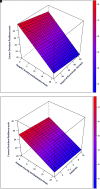Resilience and Mental-Health Symptoms in ICU Healthcare Professionals Facing Repeated COVID-19 Waves
- PMID: 38163380
- PMCID: PMC10919111
- DOI: 10.1164/rccm.202305-0806OC
Resilience and Mental-Health Symptoms in ICU Healthcare Professionals Facing Repeated COVID-19 Waves
Abstract
Rationale: Psychological resilience (the ability to thrive in adversity) may protect against mental-health symptoms in healthcare professionals during coronavirus disease (COVID-19) waves. Objectives: To identify determinants of resilience in ICU staff members. Methods: In this cross-sectional survey in 21 French ICUs, staff members completed the 10-item Connor-Davidson Resilience Scale, Hospital Anxiety and Depression Scale, and Impact of Event Scale-Revised (for post-traumatic stress disorder [PTSD]). Factors independently associated with resilience were identified. Measurements and Main Results: The response rate was 73.1% (950 of 1,300). The median 10-item Connor-Davidson Resilience Scale score was 29 (interquartile range, 25-32). Symptoms of anxiety, depression, and PTSD were present in 61%, 39%, and 36% of staff members, respectively. Distress associated with the COVID-19 infodemic was correlated with symptoms of depression and PTSD. More resilient respondents less often had symptoms of anxiety, depression, and PTSD. Greater resilience was independently associated with male sex, having provided intensive care during the early waves, having managed more than 50 patients with COVID-19, and, compared with earlier waves, working longer hours, having greater motivation, and more often involving families in end-of-life decisions. Independent risk factors for lower resilience were having managed more than 10 patients who died of COVID-19, having felt frightened or isolated, and greater distress from the COVID-19 infodemic. Conclusions: This study identifies modifiable determinants of resilience among ICU staff members. Longitudinal studies are needed to determine whether prior resilience decreases the risk of mental ill health during subsequent challenges. Hospital and ICU managers, for whom preserving mental well-being among staff members is a key duty, should pay careful attention to resilience.
Keywords: acute respiratory distress syndrome; coronavirus; post-traumatic growth; post-traumatic stress disorder; vulnerability.
Figures



Comment in
-
Resiliency and Mental Health in the ICU.Am J Respir Crit Care Med. 2024 Mar 1;209(5):481-482. doi: 10.1164/rccm.202401-0066ED. Am J Respir Crit Care Med. 2024. PMID: 38285556 Free PMC article. No abstract available.
-
Resilience and Stress Are Heterogenic Too: We Should Act Accordingly.Am J Respir Crit Care Med. 2024 Jul 15;210(2):245-246. doi: 10.1164/rccm.202403-0648LE. Am J Respir Crit Care Med. 2024. PMID: 38701443 Free PMC article. No abstract available.
Similar articles
-
Association Between Resilience and Family Member Psychologic Symptoms in Critical Illness.Crit Care Med. 2016 Aug;44(8):e721-7. doi: 10.1097/CCM.0000000000001673. Crit Care Med. 2016. PMID: 27097294 Free PMC article.
-
Coronavirus disease 2019 crisis in Paris: A differential psychological impact between regular intensive care unit staff members and reinforcement workers.Aust Crit Care. 2021 Mar;34(2):142-145. doi: 10.1016/j.aucc.2020.11.005. Epub 2020 Nov 27. Aust Crit Care. 2021. PMID: 33358273 Free PMC article.
-
Association of COVID-19 Acute Respiratory Distress Syndrome With Symptoms of Posttraumatic Stress Disorder in Family Members After ICU Discharge.JAMA. 2022 Mar 15;327(11):1042-1050. doi: 10.1001/jama.2022.2017. JAMA. 2022. PMID: 35179564 Free PMC article.
-
[Health professionals facing the coronavirus disease 2019 (COVID-19) pandemic: What are the mental health risks?].Encephale. 2020 Jun;46(3S):S73-S80. doi: 10.1016/j.encep.2020.04.008. Epub 2020 Apr 22. Encephale. 2020. PMID: 32370984 Free PMC article. French.
-
Psychological interventions to foster resilience in healthcare professionals.Cochrane Database Syst Rev. 2020 Jul 5;7(7):CD012527. doi: 10.1002/14651858.CD012527.pub2. Cochrane Database Syst Rev. 2020. PMID: 32627860 Free PMC article.
Cited by
-
Reply to Zijlstra: Resilience and Stress Are Heterogenic Too: We Should Act Accordingly.Am J Respir Crit Care Med. 2024 Jul 15;210(2):246-247. doi: 10.1164/rccm.202404-0790LE. Am J Respir Crit Care Med. 2024. PMID: 38701491 Free PMC article. No abstract available.
-
HELLO: a protocol for a cluster randomized controlled trial to enhance interpersonal relationships and team cohesion among ICU healthcare professionals.Intensive Care Med Exp. 2024 Oct 7;12(1):90. doi: 10.1186/s40635-024-00677-w. Intensive Care Med Exp. 2024. PMID: 39373831 Free PMC article.
-
Critical Care: A Special Issue of the Blue Journal.Am J Respir Crit Care Med. 2024 Mar 1;209(5):465-467. doi: 10.1164/rccm.202401-0233ED. Am J Respir Crit Care Med. 2024. PMID: 38300147 Free PMC article. No abstract available.
-
Chinese college students' mental health during the first three months of the COVID-19 pandemic: the protective role of family functioning.Front Public Health. 2024 Apr 25;12:1383399. doi: 10.3389/fpubh.2024.1383399. eCollection 2024. Front Public Health. 2024. PMID: 38726230 Free PMC article.
-
Recall bias secondary to major trauma: results from a prospective study of the Beirut Port Blast.Eur J Psychotraumatol. 2025 Dec;16(1):2494360. doi: 10.1080/20008066.2025.2494360. Epub 2025 May 7. Eur J Psychotraumatol. 2025. PMID: 40332162 Free PMC article.
References
-
- Levi P, Moss J. Intensive care unit nurses’ lived experiences of psychological stress and trauma caring for COVID-19 patients. Workplace Health Saf . 2022;70:358–367. - PubMed
-
- Moore DJ, Dawkins D, Hampton MD, McNiesh S. Experiences of critical care nurses during the early months of the COVID-19 pandemic. Nurs Ethics . 2022;29:540–551. - PubMed
Publication types
MeSH terms
Supplementary concepts
Grants and funding
LinkOut - more resources
Full Text Sources
Medical

